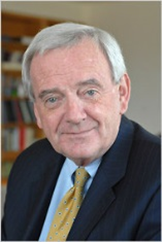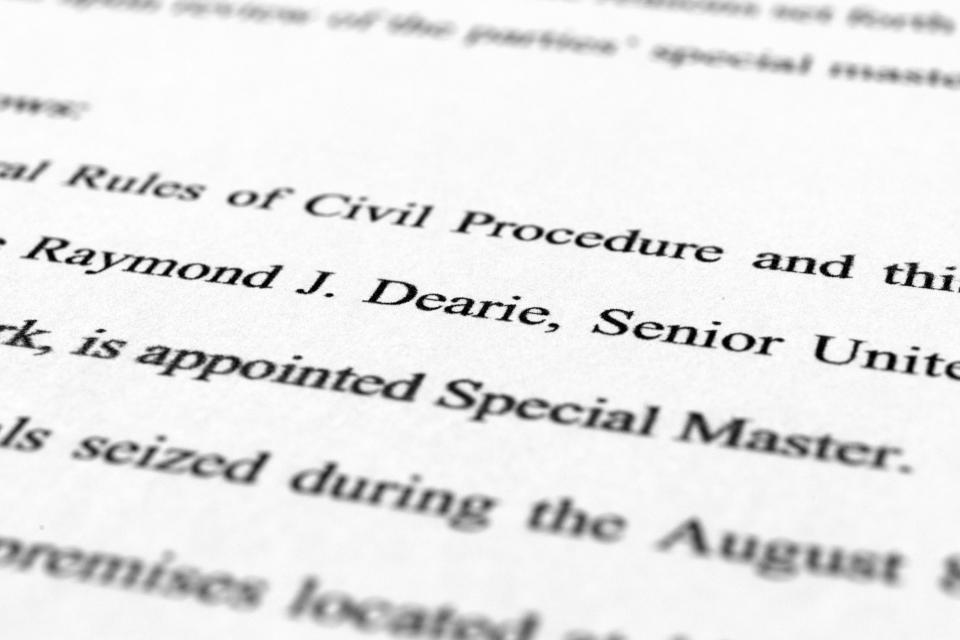Not his 'first rodeo': Special master in Mar-a-Lago probe is no stranger to huge cases
NEW YORK – Raymond Dearie, the Brooklyn federal judge chosen as special master to review documents the FBI seized from former President Donald Trump's Florida home, has spent a lifetime handling high-profile cases.
After defense and court-appointed psychiatrists concluded that suspected Mob boss Vincent "The Chin" Gigante was not competent to be tried, Dearie had reservations. He postponed a ruling to gather more information. Gigante was tried and convicted in 1997 on racketeering and murder conspiracy charges.
When prosecutors in a sprawling criminal case against executives who govern international soccer tried to continue keeping an informant's guilty plea secret, Dearie ruled in 2015 that the government hadn't proved that was necessary and made the information public.
And in 2012, after an opening on the secretive Foreign Intelligence Surveillance Court that oversees warrants for government wiretapping and spy investigations, Dearie got the nod from U.S. Supreme Court Justice John Roberts.
Now Dearie, 78, a semi-retired federal judge in the Eastern District of New York, faces possibly his biggest legal challenge. He was tapped on Thursday to review thousands of pages of classified and top-secret documents and other material FBI agents seized Aug. 8 from Trump's Mar-a-Lago mansion. The seizures were made pursuant to a court-approved search warrant.

Pending an appeal by prosecutors, he will decide whether any of the material is subject to executive privilege or attorney-client privilege, rulings that could affect the outcome of the investigation.
Dearie scheduled a preliminary conference with lawyers for Trump and the Justice Department on Tuesday afternoon in Brooklyn federal court. He instructed the legal teams to file proposed agenda items by the the close of business hours on Monday.
"Judge Dearie brings significant experience in national security matters given his prior service on the FISA court. This isn't his first rodeo. He certainly knows a thing or two about sensitive government records," said Mary Mulligan, a prominent New York City defense lawyer who represented Chuck Blazer, the informant in the global soccer investigation. She is not involved in the Trump case.
Dearie's appointment wasn't a given, however.
Federal prosecutors initially opposed a special master, a neutral third party who examines evidence gathered by investigators. In written arguments submitted to Florida U.S. District Court Judge Aileen Cannon, they argued the appointment was unneeded because investigators not involved in the case had already filtered out attorney-client material. They also argued that a former president lacks authority to claim executive privilege over classified government records.
Mar-a-Lago judge denies DOJ stay motion: Judge names Raymond Dearie special master to review Mar-a-Lago documents but keeps pause on DOJ investigation of Donald Trump
Classified or not? Trump has argued he declassified Mar-a-Lago documents. For his legal defense, it might not matter
Got them all? OnPolitics: National Archives unsure if they have all Trump documents from Mar-a-Lago
Cannon denied prosecutors' motion to stay part of her ruling and tapped Dearie, who was recommended by Trump's lawyers and then accepted by prosecutors.
"He's an ideal choice for this case. People on both sides of the aisle respect Judge Dearie. He's not pro-this or pro-that," said Alan Vinegrad, a top Manhattan lawyer who was the Brooklyn U.S. Attorney during part of Dearie's judicial tenure. The fact that both sides recommended him for special master "speaks highly of him."

Dearie is a native of Rockville Centre, a Long Island village east of New York City. But he has been a Brooklyn guy since his graduated from Fairfield University and earned his legal degree at St. John's University School of Law. After two years in private practice, he worked in the Brooklyn U.S. Attorney's office and ultimately headed the office for four years. In 1986, President Ronald Reagan nominated Dearie as a Brooklyn federal judge.
Steve Gold, a Rutgers Law School professor who was a law clerk for Dearie, said the early mentor's approach to the law and cases is "thorough, conscientious and careful. He decides cases and issues fairly."
Vincent 'The Chin' Gigante
Although the Gigante case was ultimately decided in proceedings presided over by other judges, Dearie's decision to seek more information about the mental state of the accused mobster who sometimes roamed city streets in a bathrobe was a legal turning point later cited by Judge Jack Weinstein in a court filing.
The evidence against Gigante "demonstrated without a reasonable doubt that Mr. Gigante had been the boss of the Genovese Crime Family since at least 1985 and that he was guilty of the crimes and predicate acts of which the jury found him guilty from that date forward," wrote Weinstein.
The FIFA investigation
One of the cases that emerged from the federal investigation of FIFA, soccer's governing body, was against Charles Blazer, a former FIFA executive committee member and former second-highest official of soccer in North America, Central America and the Caribbean region.
He secretly pleaded guilty in November 2013. During a hearing in a closed and locked courtroom, Blazer admitted that among other things he and other officials accepted bribes to hold the 2010 World Cup, soccer's grand quadrennial tournament, in South Africa.
Despite the secrecy, several media outlets published news stories about Blazer's cooperation and suspected misdeeds. The New York Daily News reported that federal investigators in 2011 "flipped" Blazer into cooperating. He afterward secretly recorded other soccer officials for the government.
Prosecutors urged Dearie to keep the transcript of Blazer's guilty plea secret. They argued that making the document public would tip off investigation targets about details of the inquiry, as well as endanger Blazer.
While the government’s dire predictions may be hyperbolic, they are not unreasonable or farfetched," Dearie wrote in his June 2015 ruling. "However, I simply cannot conclude that disclosure of Blazer’s cooperation agreement would result in a substantial prejudice to these interests, particularly in light of the extensive amount of information already in the public domain and repeatedly attributed to law enforcement sources."
The FISA court
In 2012, Dearie began a seven-year term on the court that oversees government warrants to use wiretaps and other investigative devices and techniques in investigations of suspected spies and other targets.
Most of his work on that court remains secret. But details of one case were cited in a report in December 2019 by the Justice Department's Office of Inspector General. The report focused on applications to the court for secret surveillance of Carter Page, a 2016 Trump presidential campaign policy adviser.
Renewal applications to the FISA court for continued surveillance of Page were reviewed and approved by Dearie and other judges, the report said. "Those applications "contained a number of factual representations that were inaccurate, incomplete, or unsupported by appropriate documentation, based upon information in the FBI's possession at the time the applications were filed," the report said.
Trump has criticized federal investigators' surveillance of Carter. But the Trump legal team recommendation of Dearie for special master appeared to show the former president didn't blame the judge for the troubling episode.
The recommendation did not contain specific reasons for supporting Dearie or Paul Huck Jr., a second special master nominee forwarded by Trump's attorneys. A supplemental court filing, however, said Trump's legal team "is willing to provide our specific rationale for supporting our nominees if and when the court so orders."
This article originally appeared on USA TODAY: Raymond Dearie, special master in the Mar-a-Lago seizures, is no stranger to high profile cases

